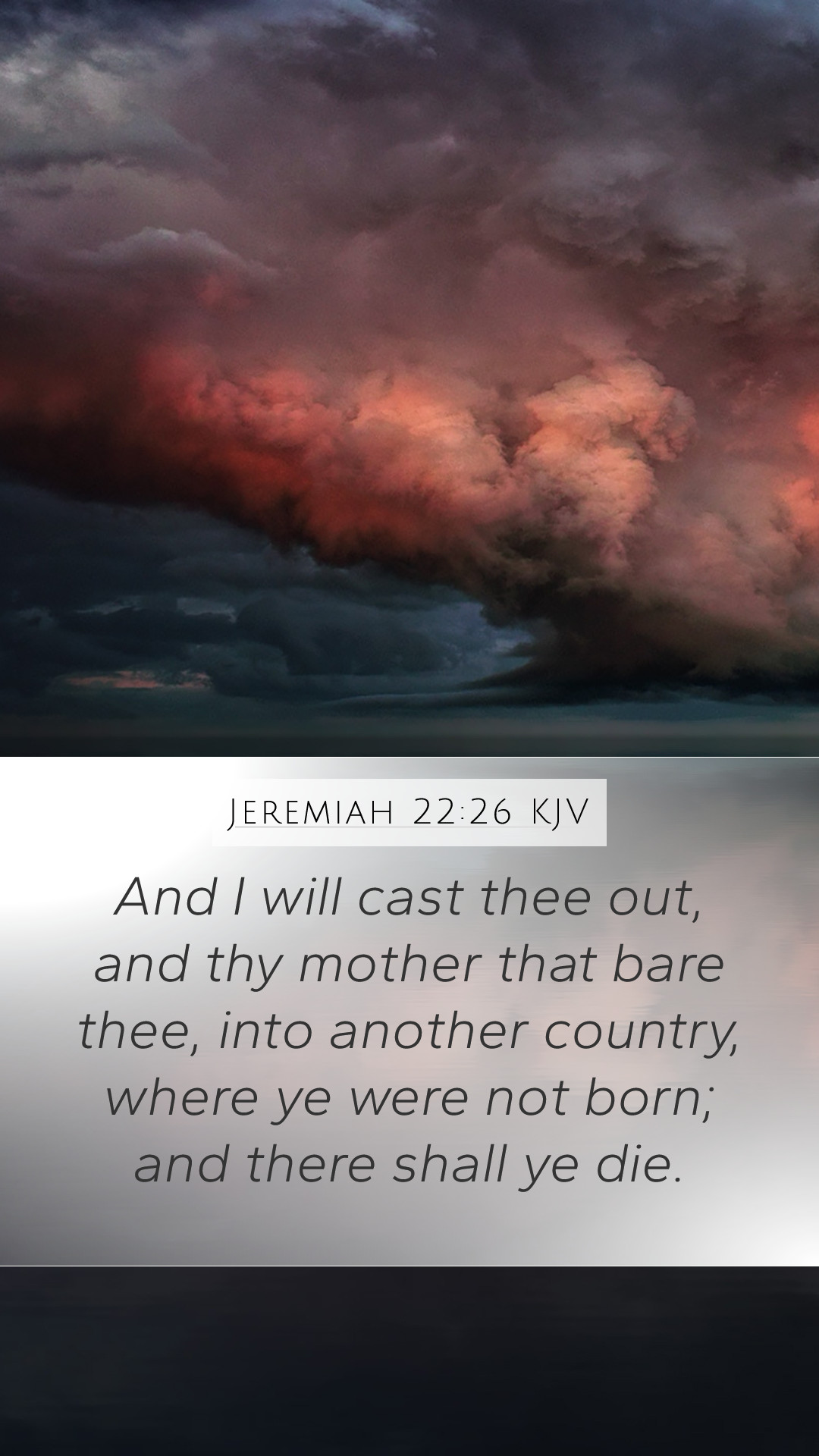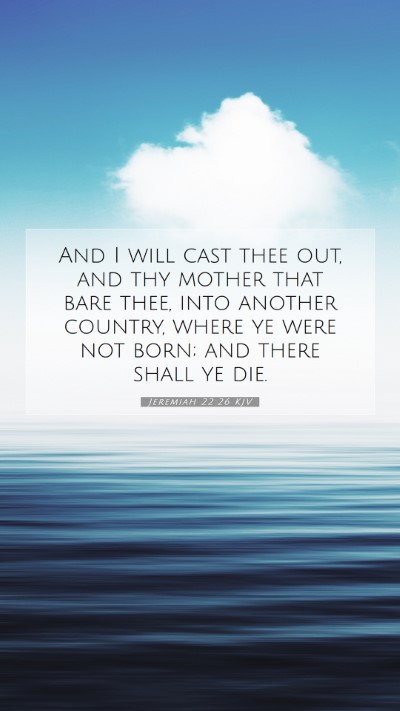Understanding Jeremiah 22:26
Jeremiah 22:26 states, "And I will cast thee out, and thy mother that bare thee, into another country, where ye were not born; and there shall ye die." This verse carries profound significance in its warning and prophetic declaration regarding King Jehoiakim of Judah. Below is a detailed exploration of its meaning, combining insights from esteemed commentaries throughout the ages.
Bible Verse Meanings
This verse serves as a stark reminder of the consequences that result from disobedience to God. It highlights the ultimate fate of those in positions of power who fail to honor their responsibilities and abide by divine law.
Bible Verse Interpretations
- Matthew Henry's Commentary: Henry notes that this verse represents the Lord's declaration against Jehoiakim, illustrating that despite his royal status, he would face exile and death outside his homeland. Henry emphasizes that the line of reproach will extend from Jehoiakim to his mother, symbolizing the complete fall of a house that once stood in privilege.
- Albert Barnes' Notes: Barnes indicates that this passage serves as a prophetic warning. Jehoiakim's failure to heed God's commandments and the corruption within his reign would lead to dire consequences. He not only faced physical displacement but also a spiritual one, characterized by rejection from God and estrangement from his people.
- Adam Clarke's Commentary: Clarke elaborates on the implications of exile. He suggests that this piece underscores the forfeiture of privileges that come with God's favor. Being cast into a foreign land signifies not merely a change of location but a complete separation from God’s blessings and the Jewish homeland.
Bible Verse Understanding
The understanding of Jeremiah 22:26 is deeply rooted in the historical context of Judah's monarchs. Kings were often held accountable for the moral and spiritual state of their nations, and disobedience could lead to national judgment, resulting in their removal from the throne. This verse explicitly illustrates the drastic nature of God’s judgment and sets a precedent for how leaders should conduct themselves with integrity.
Bible Verse Explanations
In explicating this verse, one can consider the broader narrative of the Book of Jeremiah, which frequently addresses themes of judgment, repentance, and hope for restoration. The explanation goes beyond mere historical facts and delves into the spiritual principles that govern fidelity and accountability to God.
Scripture Analysis
The analysis of Jeremiah 22:26 reveals several layers of meaning:
- Judgment on Authority: The verse acts as a cautionary tale for those in power. It emphasizes that authority comes with responsibility towards God and one’s subjects.
- Exile Symbolism: Exile is a recurring theme in the Bible that often suggests a severing of relationship with God. This aligns with Israel's repeated turning away from divine ordinances.
- Parental Reflection: The mention of his mother adds a personal dimension, revealing that familial connections do not shield one from judgment.
Biblical Exegesis
This verse serves as a cornerstone for biblical exegesis, demonstrating how historical narratives can reveal larger theological truths. It compels readers to explore not only the literal meanings but also the implications for faith and daily living today.
Bible Study Insights
For those engaging in bible study groups or looking for effective bible study tools, Jeremiah 22:26 provides a significant point of reflection on leadership and responsibility. Insights gained from this verse can foster discussions on personal accountability, societal justice, and the nature of leadership in a biblical context.
Cross References
- 2 Kings 24:6-7 - Discusses Jehoiakim's reign and eventual downfall.
- Jeremiah 36:30 - Prophetic judgment on Jehoiakim for his actions.
- Ezekiel 19:5-9 - Symbolizes the royal lineage and its destruction.
Application in Daily Life
The application of Jeremiah 22:26 extends beyond its immediate historical context. It serves as a practical reminder of the importance of righteousness, both in personal conduct and leadership. Individuals can derive principles from this verse to guide their decisions, ensuring they align with spiritual truths and accountability.
Conclusion
In summary, Jeremiah 22:26 encapsulates a critical message regarding divine judgment and accountability. Through understanding this verse, readers can gain insights into the significance of living with integrity and the consequences of straying from God’s path, fostering a more profound appreciation of bible verse meanings and invites deeper contemplation within the realm of understanding Scripture.


